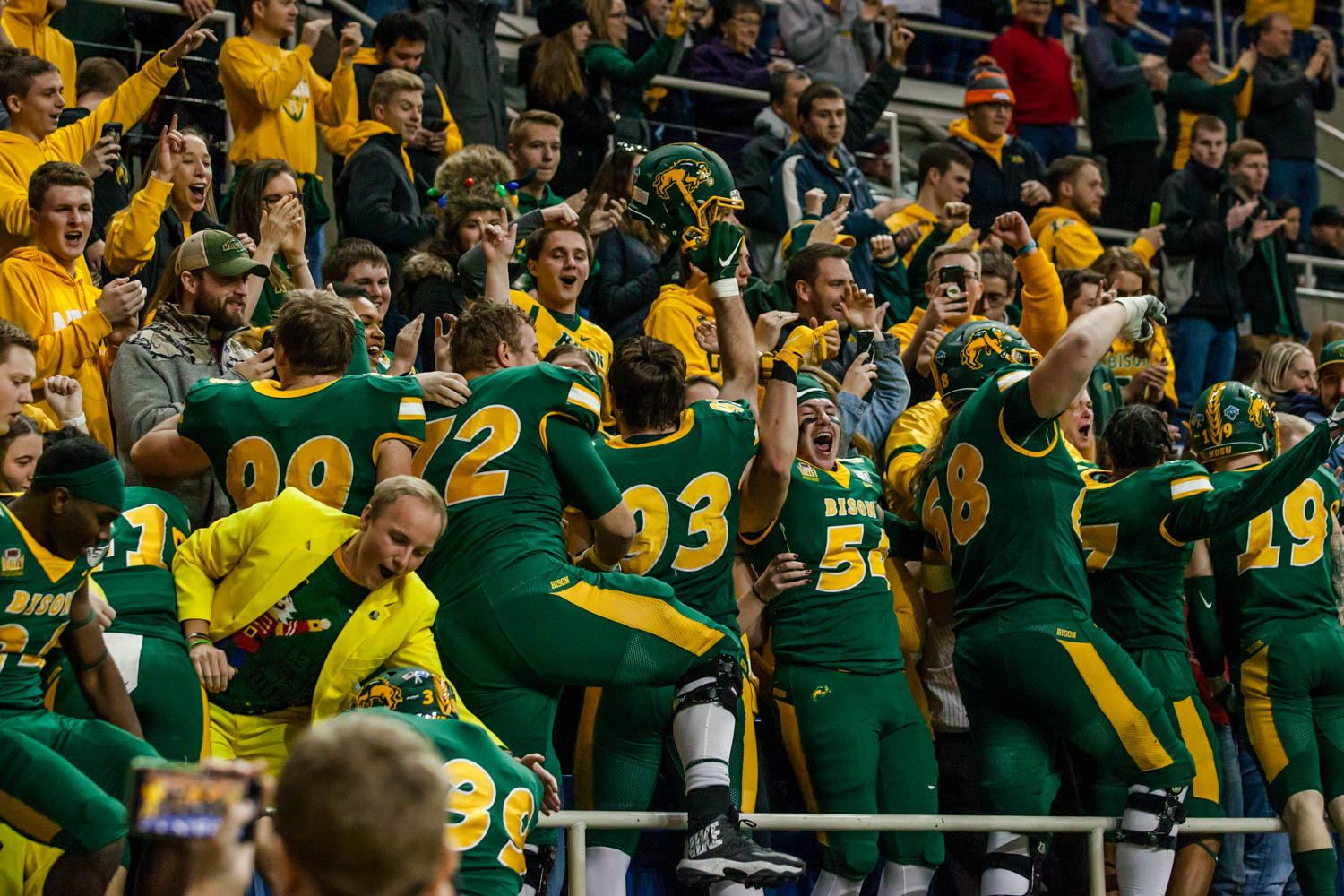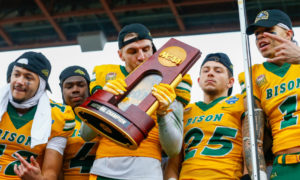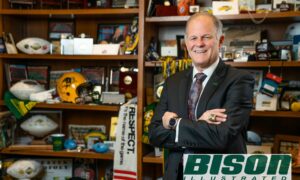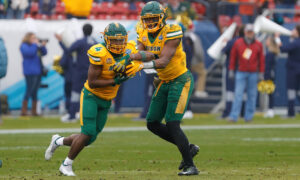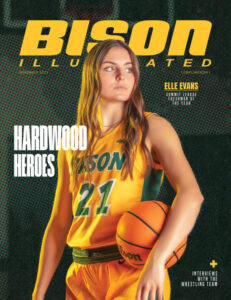Photo By Hillary Ehlen
The whole is greater than the sum of its parts. The strength of the Bison is the Herd. Conversely, in a Euclidean sort of way, the whole is nothing but a collection of its parts. The Herd is nothing but the sum of its Bison. It’s true for any team, for the businesses and organizations we belong to – professional or otherwise – and it’s true for who we are as America. For better, and sadly, far too many times than we want to count this year, for worse.
According to the Department of the Treasury, the motto of the United States, appearing on our Great Seal, E Pluribus Unum, first appeared in June 1782 in the Journal of the Continental Congress. That motto, which translates to “Out of many, one,” has graced the $1 bill since 1935.
We’re finding out a lot this year, maybe more than any year since 1968, what the sum of our parts really is and if we’ve lived up to that sacred motto, E Pluribus Unum. Heartaches as old as our founding documents, old as the Scriptures, festering wounds laying below the surface, have been ripped open anew. What do we choose to do about that pain and suffering, that visceral hurt? It cannot be ignored. It cannot be ignored because it permeates every area of our lives. It cannot be ignored because it impacts all of us, including our brothers and sisters that are student-athletes, students, coaches and professors at North Dakota State. It impacts our neighborhoods and communities.
You cannot cheer for a Bison sprinting across the goal line for a touchdown, soaring to grab an interception, buy their jerseys at Scheels or the campus bookstore, and tailgate in the shadow of what they’ve built while continuing to ignore that pain that aches deep down to the soul.
I can’t pretend to understand or fathom what many of our brothers and sisters are going through and feeling when Breonna Taylor, George Floyd and scores of others are killed. Maybe that’s part of the problem. It’s 2020, and do we truly understand that it’s the sum of ALL our parts that matter – not just the parts we grew up with, not just the parts we see and experience in our daily lives. Just like the farm bankruptcies and suicides in rural America don’t resonate with everyone, they hit painfully close to home for those of us who grew up in farm country.
We have to do a better job understanding, of having empathy, of walking a mile in one another’s shoes. To borrow from that great Prayer of Saint Francis – to not seek as much to be consoled as to console, to be understood as to understand, to be loved as to love.
There’s a great podcast by one of America’s living treasures and historians, Jon Meacham, called “It Was Said.” Meacham is a presidential biographer and former editor-in-chief of Newsweek. He’s authored books on George H.W. Bush, Thomas Jefferson, Andrew Jackson, Franklin D. Roosevelt and Winston Churchill, and the civil rights icon, John Lewis. He eulogized both George H.W. Bush and his wife, Barbara. One of Meacham’s more recent books, The Soul of America: The Battle for Our Better Angels, is moving and sobering. I encourage you to listen to Meacham’s podcast, to really listen to it.
In “It Was Said,” Meacham tells the story behind some of the greatest speeches in our nation’s history. Our de facto republic gospels. The first four episodes are Martin Luther King, Jr.’s last speech in Memphis in April 1968 before being murdered; Robert F. Kennedy breaking the news of King’s assassination to a crowd assembled for what was supposed to be a campaign rally in Indianapolis; Barack Obama’s Charleston sermon where he eulogized the victims of the massacre at the Emanuel AME Church in Charleston, South Carolina in 2015 reminding us of the importance of grace, and Ronald Reagan’s “shining city on a hill” presidential farewell address in 1989.
Driving to work in downtown Fargo one early morning, listening to the episode on the Emanuel AME Church shooting, something that the widow of senior pastor Rev. Clementa Pinckney said caught my ear. Rev. Pinckney was leading a Bible study inside the church when a deranged man full of hate walked in, and mercilessly gunned down nine people in cold blood. I hit the 15-second rewind button on my iPhone three or four times the last few blocks to the office to replay what she said. Jennifer Pinckney talked about how her late husband would always tell their daughters, “You need to stop and listen to people.”
Can we really say that we’re listening to one another? I mean really listening to one another. Many of you reading this are thinking, Stay in your lane, Swany! This magazine is about sports and the Bison! This is my lane. It’s all our lane. If you’re glad to cheer our Bison players dominating on the football field and basketball courts, the track and field and softball diamonds, in the classrooms and the board rooms, but you don’t care enough to listen to their pain and hurt away from it, what does that say about you? What does that say about us?
We all need to stop, just stop and listen to each other. We’ve been talking past one another, making excuses and trying to avoid conversations and topics like this for far too long. Conversations that eluded our great grandparents, grandparents, parents and now us.
That must stop, and it must stop now.
We can’t bequeath this sad history to our children. We’ve done that for generations, it hasn’t – and doesn’t – work. As cries for justice pierce this land, a place we all call home, something that a Bison football player’s mom posted on social media hit just as hard as Rev. Pinckney’s widow saying we “need to stop and listen.”
This mom wrote about her fear for her sons, fear of what will happen to them, just because they’re black. In 2020 America. This mom, whose son plays for the Bison, worries for his safety because of the color of his skin. On the field, her sons are adored and cheered. But away from the field, without the jerseys and helmets, for something as simple as wearing a hoodie with their hands in their pockets, their lives could be in jeopardy. Ask yourself, do you agree with that? Of course, you don’t. Then why do we accept it?
It doesn’t have to be this way. Where there is hatred, let me bring love. Where there is discord, let me bring union. Where there is despair, let me bring hope.
How do we hear that mom and not say why, how and what can we do to help? How do we not feel for her pain and worry? My heart goes out to this mom and her husband, especially as a parent myself. I feel such heartache that today, millions of parents live with that kind of fear – fear that most of us will never experience with our children.
Libby and I will never have to have “the conversation” with Maverick. How can any of us sit by and not care, not have empathy, not want to do something? How can you say stay in your lane when this mom and dad – whose son is a Bison – lives with that? Where there is darkness, let me bring your light. Where there is sadness, let me bring joy.
When we don’t listen, our hearts only harden, and we condemn our children to repeat our mistakes. We are the sum of all our parts, and must do better by one another.
When one Bison hurts, the Herd hurts. When one part of our national soul suffers, our entire soul suffers with it.
It’s time to stop. It’s time to listen.

